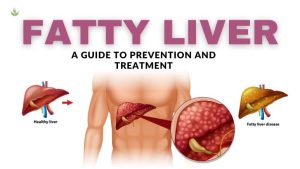
Foods that are beneficial for fatty liver

Foods Beneficial for Fatty Liver
Fatty liver disease, whether alcoholic or non-alcoholic (NAFLD), requires a healthy diet to manage symptoms and prevent complications. Below is a detailed guide on foods that are particularly beneficial for fatty liver: Fatty liver is when there is too much fat in your liver. It's common, particularly in people who have diabetes and are overweight. Although it might not cause any symptoms, it can lead to significant health problems. Making changes to your lifestyle is key to preventing and improving the condition.
1. Vegetables and Leafy Greens
- Cruciferous Vegetables: Broccoli, Brussels sprouts, and cauliflower are rich in antioxidants and compounds that support liver detoxification.
- Spinach and Kale: Packed with fiber and nutrients, they help reduce liver fat accumulation.
- Beetroot: Contains nitrates and antioxidants (betaines) that reduce oxidative stress and inflammation in the liver.
2. Fruits
- Citrus Fruits: Oranges, lemons, and limes contain vitamin C and antioxidants that support liver health.
- Berries: Blueberries, raspberries, and strawberries are high in polyphenols that combat liver inflammation.
- Apples: High in fiber and antioxidants, apples help regulate blood sugar and reduce liver stress.
- Avocado: Contains healthy fats and compounds like glutathione, which assist in detoxifying the liver.
3. Whole Grains
- Brown rice, quinoa, oats, and whole wheat are excellent sources of fiber that improve digestion and lower liver fat. Oatmeal, in particular, is a great breakfast option for stabilizing blood sugar levels and reducing fatty deposits in the liver.
4. Lean Proteins
- Fish: Fatty fish like salmon, mackerel, and sardines are rich in omega-3 fatty acids, which reduce inflammation and liver fat.

- Poultry: Skinless chicken and turkey provide high-quality protein without excess fat.
- Plant Proteins: Lentils, beans, and tofu are great plant-based options, as they are low in saturated fat and high in nutrients.
5. Healthy Fats
- Nuts and Seeds: Almonds, walnuts, chia seeds, and flaxseeds are rich in omega-3s, antioxidants, and fiber.
- Olive Oil: A monounsaturated fat that reduces liver enzyme levels and fat accumulation.
- Avocado: Provides monounsaturated fats that are heart and liver-friendly.
6. Herbs and Spices
- Turmeric: Contains curcumin, which reduces inflammation and oxidative stress in the liver.
- Garlic: Helps lower liver fat and improve liver enzyme function.
- Green Tea: Rich in catechins, green tea boosts liver function and reduces fat.
7. Dairy and Alternatives
- Low-Fat Dairy: Yogurt, kefir, and skimmed milk are good sources of calcium and probiotics, which improve gut and liver health.
- Plant-Based Milk: Almond or oat milk (unsweetened) is a low-fat alternative to reduce liver stress.
8. Beverages
- Coffee: Studies show moderate coffee consumption reduces liver fat and protects against liver fibrosis.
- Green Tea: Offers antioxidant benefits and supports liver detoxification.
- Water: Staying hydrated is essential for overall liver function.
9. High-Fiber Foods
- Foods like lentils, beans, and whole grains aid digestion, prevent fat build-up, and regulate blood sugar levels.

- Psyllium Husk: An excellent source of soluble fiber for those with fatty liver.
10. Special Superfoods
- Walnuts: Particularly beneficial for those with NAFLD due to their omega-3 content.
- Grapes: Especially red and purple varieties, are high in antioxidants like resveratrol.
- Soy Products: Tofu and soy milk can reduce fat accumulation in the liver.
Foods to Avoid
While focusing on these beneficial foods, it’s equally important to avoid:
- Processed and fried foods.
- Sugary beverages like soda.
- Refined carbohydrates (white bread, pastries).
- Saturated and trans fats (butter, margarine).
- Alcohol.
General Tips
- Follow a Mediterranean or DASH diet, both of which are liver-friendly.
- Opt for small, balanced meals to avoid overburdening the liver.
- Maintain an active lifestyle alongside a healthy diet to maximize liver health.
Would you like recipes or a meal plan using these ingredients?
Reducing a fatty liver (steatosis) involves lifestyle changes, dietary modifications, and, in some cases, medical treatment. Here’s a comprehensive guide to help you improve liver health:
1. Adopt a Healthy Diet
- Focus on whole foods: Eat a diet rich in vegetables, fruits, whole grains, and lean protein.
- Limit added sugars: Avoid sugary drinks, desserts, and processed foods high in sugar, as they can contribute to fat buildup in the liver.
- Choose healthy fats: Opt for sources like nuts, seeds, avocados, and olive oil. Avoid trans fats and reduce saturated fats found in fried and processed foods.
- Control portion sizes: Overeating—even healthy foods—can contribute to weight gain and worsen fatty liver.
- Reduce refined carbs: Limit white bread, pasta, and rice. Replace them with whole-grain alternatives.
2. Manage Your Weight
- Lose weight gradually: Aim for 1–2 pounds per week. Sudden weight loss can stress the liver.
- Target visceral fat: This is the fat around your organs that contributes to fatty liver. Reducing overall body fat helps.
3. Increase Physical Activity
- Aerobic exercise: Activities like walking, jogging, or cycling can help reduce liver fat.
- Strength training: Building muscle through resistance exercises improves metabolism and fat burning.
- Consistency: Aim for at least 150 minutes of moderate exercise per week.
4. Avoid Alcohol
- Alcohol can exacerbate liver damage, even in small amounts, especially if you have non-alcoholic fatty liver disease (NAFLD). Minimize or eliminate alcohol consumption.

5. Control Underlying Conditions
- Manage diabetes: Keep blood sugar levels in check through diet, exercise, and medication if needed.
- Control cholesterol: Lower LDL cholesterol and triglycerides through diet or medications if prescribed.
- Regulate blood pressure: Adopt heart-healthy habits to maintain normal blood pressure.
6. Drink Coffee (If Tolerated)
- Research suggests that drinking coffee (without excessive sugar or cream) may protect against liver damage by lowering inflammation and reducing liver enzyme levels.
7. Avoid Toxins
- Limit exposure to environmental toxins, chemicals, and unnecessary medications that could stress your liver.
8. Consider Supplements (With Doctor Approval)
- Some supplements, such as vitamin E, omega-3 fatty acids, or milk thistle, may support liver health, but always consult a healthcare provider before starting supplements.
9. Regular Medical Follow-Ups
- Monitor liver enzymes through blood tests.
- If necessary, a doctor may recommend medications to reduce inflammation or fat buildup in the liver.
Fatty liver : Would you like specific dietary plans or exercise routines tailored to your preferences? Let me know!
Promoting a balanced life with organic foods, healthy recipes, and medical information for better wellness.
© 2024 DailyMeidicure.com. All Rights Reserved. Content on this site is for informational purposes only.